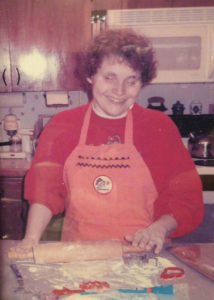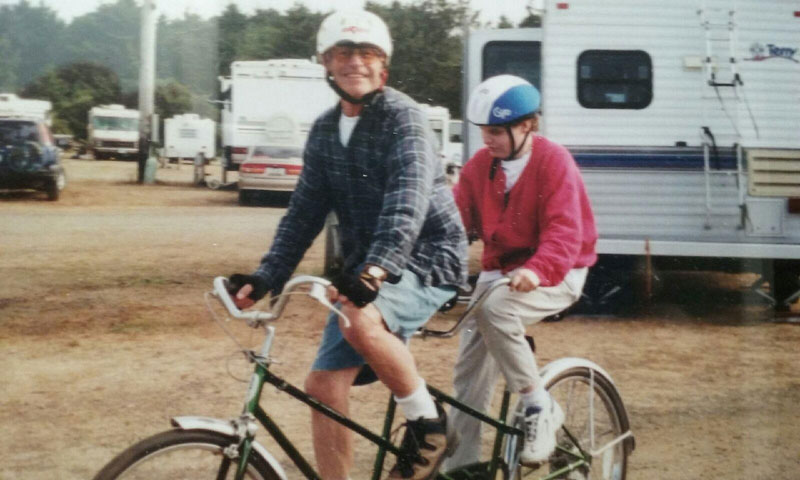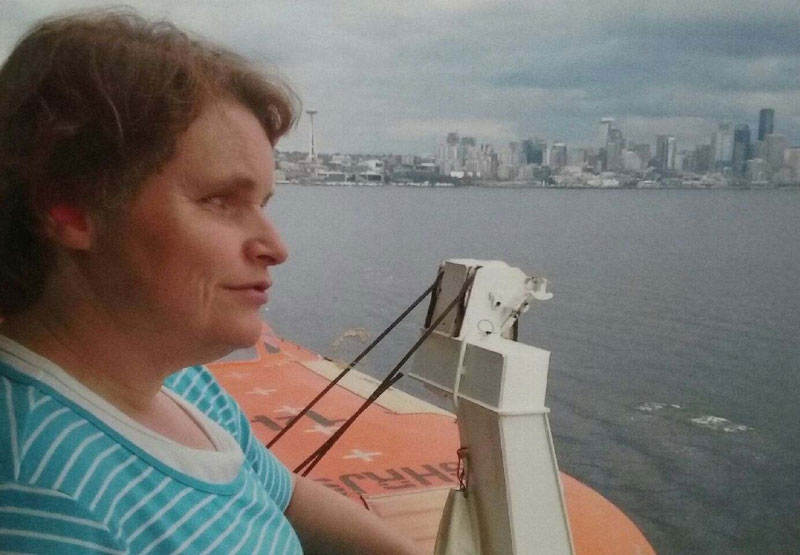Richelle Ross
Support Leads to Independence
By Linda Norlen

At the time Richelle Ross was born in 1965, her parents, Barbara and Ron were both elementary school teachers who loved kids and had worked with disabled children in summer camps. While pregnant with Richelle, the middle of three children, Barbara contracted the rubella virus during a worldwide pandemic in the years 1963–1964. Because of the disease, Richelle, like many other children, was born DeafBlind with developmental delays. (Only later in that decade would a rubella vaccine become widely available.)
Barbara went to the library and read as much as she could about the blind and deaf. She found Community Services for the Blind (now Sight Connections) when Richelle was between the ages of two and three. The group started a preschool gathering once a week for parents to discuss what was working for their child, while CSB staff interacted with the preschoolers. The Washington State Department of Services for the Blind was helpful, too, says Barbara.
Fortunately, Richelle was born at the end of the period when the disabled were often institutionalized. Instead of removing kids from their family, there were more community-based programs being developed. At home, Barbara says, they tried to give Richelle what they could: a strong, stable family.
Richelle got hearing aids at the age of two. She can hear language, but hasn’t developed good language herself. Because her speech is weak, her education has also been limited, Barbara says.

However, her parents always felt that you should take the abilities a child does have and build on those, rather than focus on what is missing. In Richelle’s case, she always liked to be physically active and they created situations where she could be. In the family’s rambler home, they outfitted her bedroom with her own personal jungle gym, complete with a slide.
Richelle has always liked playground swings and carnival rides, and, in fact, learned to walk on a bouncy swing. As a child, she went to camps, park department programs, and the YMCA, where she learned to swim. Ron engaged in a lot of physical play with all three of their children. The family bought a tandem bike so Richelle could ride with them. The whole family went camping and did outdoor activities that Richelle loved, such as skiing.
Richelle enjoys the outdoors in all weather, even in the rain. As a child, her parents gave her a raincoat and boots, because she liked to lie in the yard and let the rain fall on her face.
In time, Barbara became part of a nationwide network of parents of rubella kids. There were federal grants available around the country, including for the Northwest region. There was also state legislation and funds for school districts to do more for disabled students. Quite a few Puget Sound families had kids who were either DeafBlind or disabled in other ways. Because of their advocacy, a Preschool for the DeafBlind was founded in the Seattle School District. The school district kept building onto the program, grade by grade; Richelle was in it until her early teenage years, when she moved to the Bellevue School District for special education. Unfortunately, that program, which combined people of many different disabilities, did not serve the DeafBlind adequately.
When her parents could see that Richelle wasn’t progressing, they applied to the Washington State School for the Blind in Vancouver. In her four years there, Richelle developed many skills that built her independence. She lived in a cottage with a housemother and other girls, where they learned self-help skills, such as cooking. She had a special teacher for beginning braille and math. Because she has a very good sense of space, Richelle used her cane to go all over the campus. Richelle grew to find out that she was an individual person apart from her family.
When Richelle aged out of the state school, her parents didn’t think it would be good for her independence to move back home. She started working at the Lighthouse and lived in a group home at first. She was trained in the workday, and learned that doing a job resulted in earning money, a concept that hadn’t meant much to her before. Initially she was paid for piecework, but has since moved to an hourly salary. She can pay her rent, buy her own groceries, and pay for her personal expenses and a little traveling. Working 30 hours a week, Richelle has medical/dental insurance, paid vacation and sick days, life insurance, and a retirement program; and she pays income tax.

A job coach oversees Richelle and several other disabled workers in supported employment at the Lighthouse. Richelle is a fast worker, goal-oriented at whatever she does, and has been trained on different kinds of production jobs. Richelle loves the structure of the workday and being busy. The fact that she is employed at all is rare among the DeafBlind, who have a 90% unemployment rate, and even rarer for someone of her language ability.
Richelle became more independent and successful than her parents had ever thought possible. She has a life of her own. Though she always loves to visit her family, she can’t wait to go back to her apartment where she lives with a roommate who’s also disabled but not DeafBlind. Richelle also has a staff person who is there 24 hours a day.
Richelle feels good about the life she has. One of her favorite activities is to go on walks, long or short. Her favorite place to vacation is “ocean beach,” where the wind on her face and the smells in the air bring her joy. She enjoys chocolate and drinking coffee. She still rides horseback and skis.